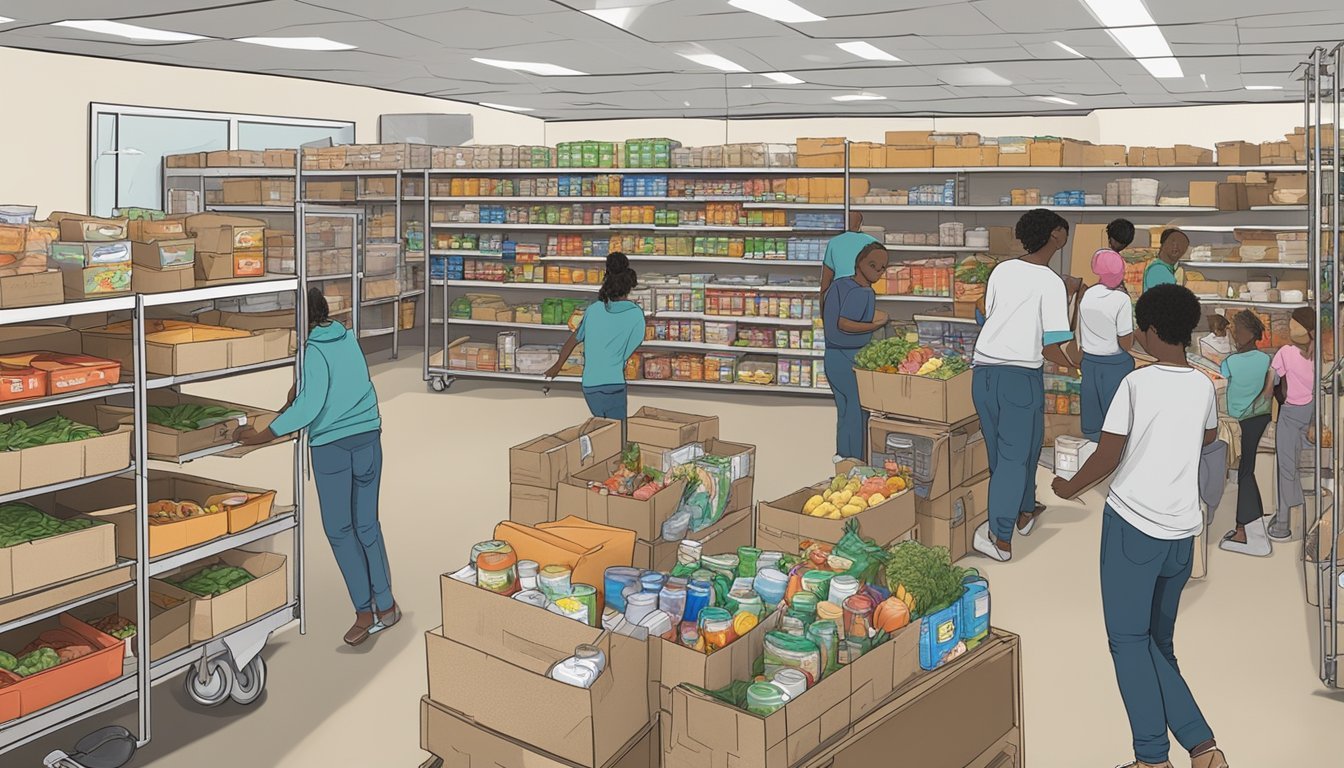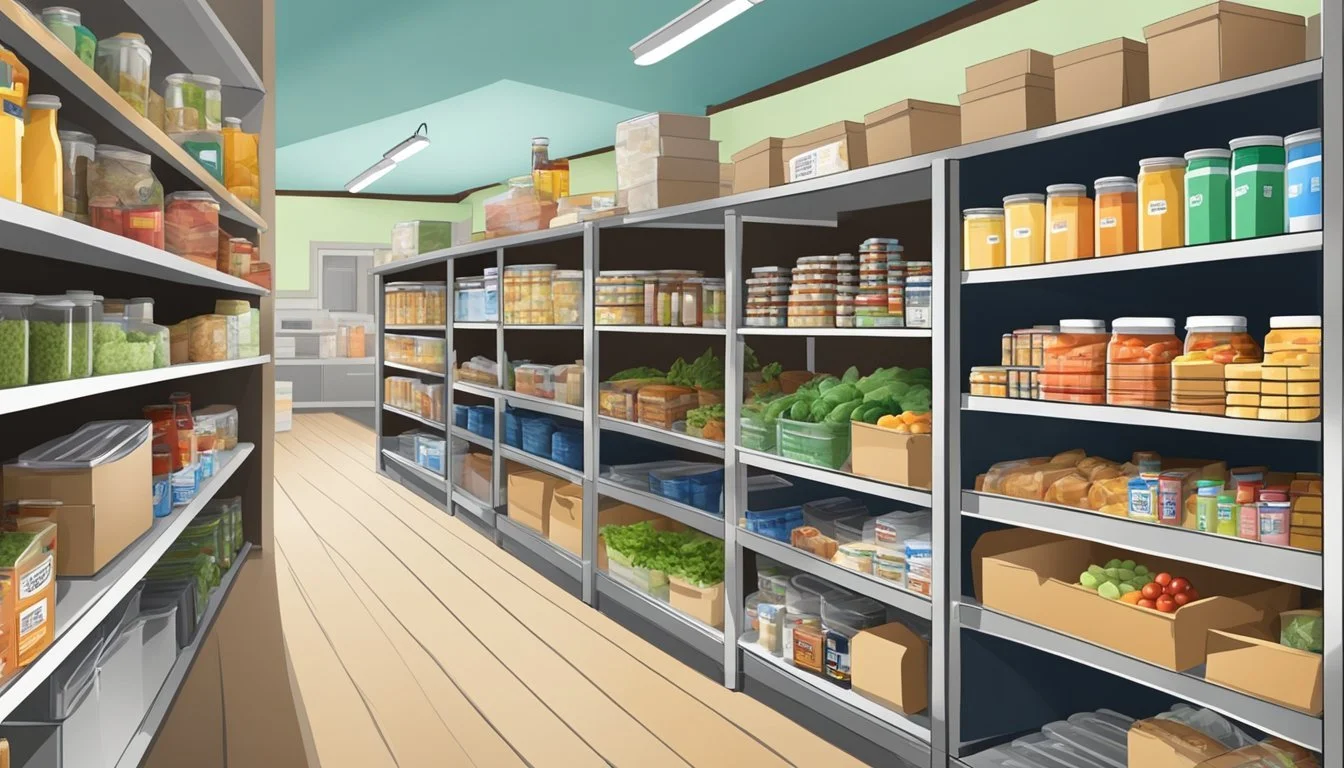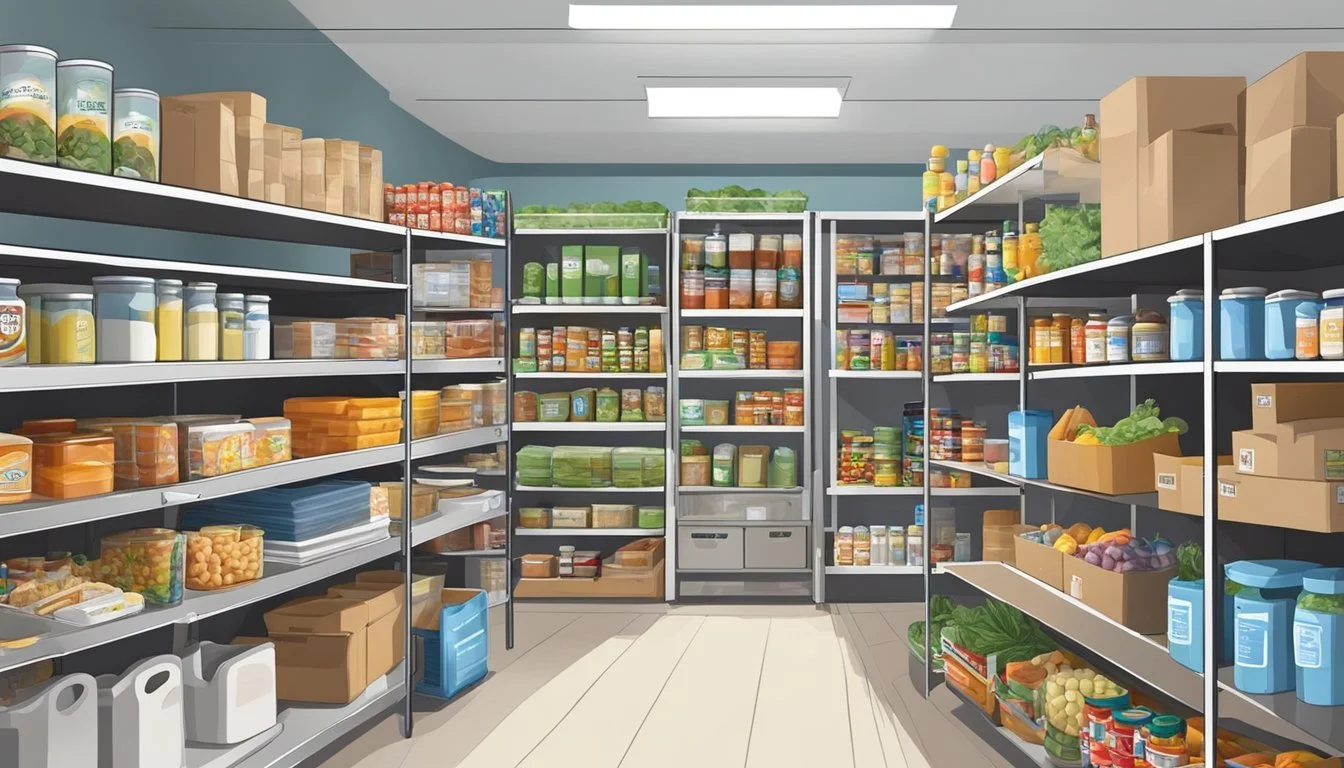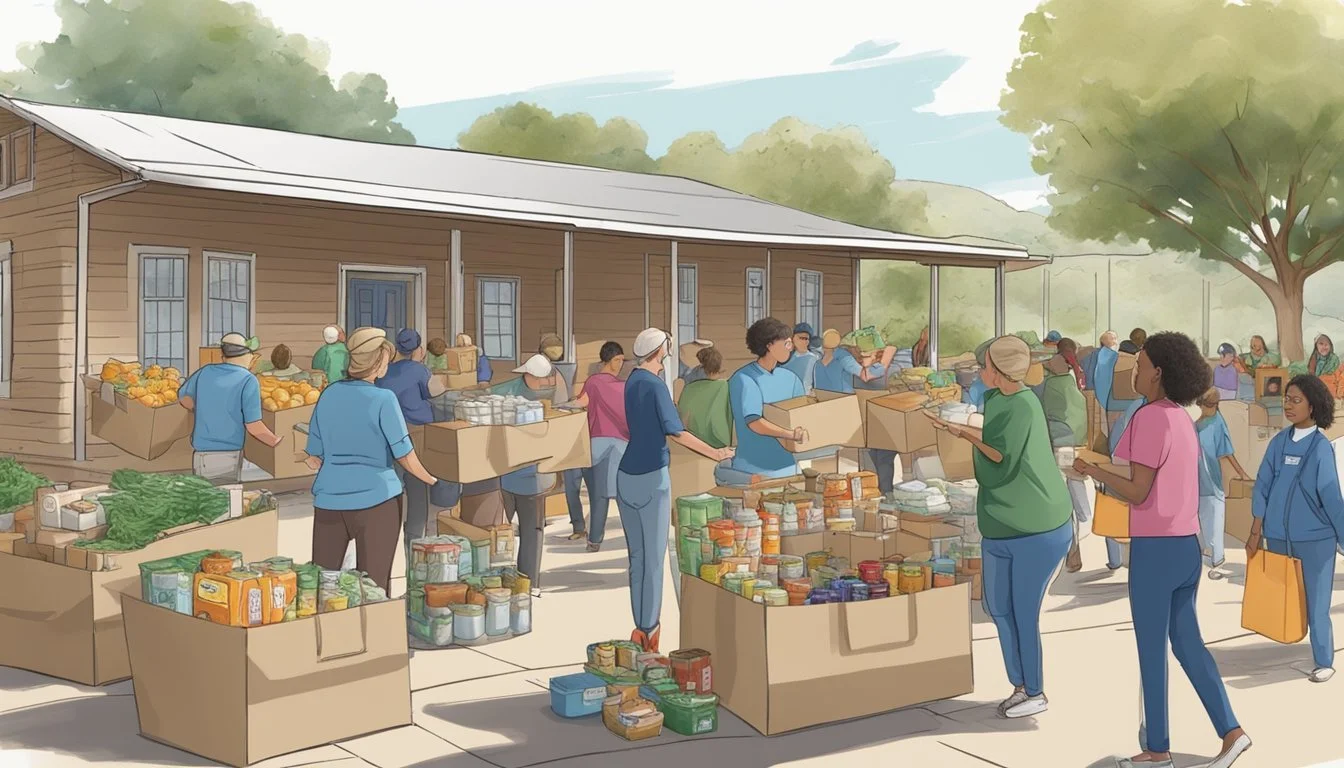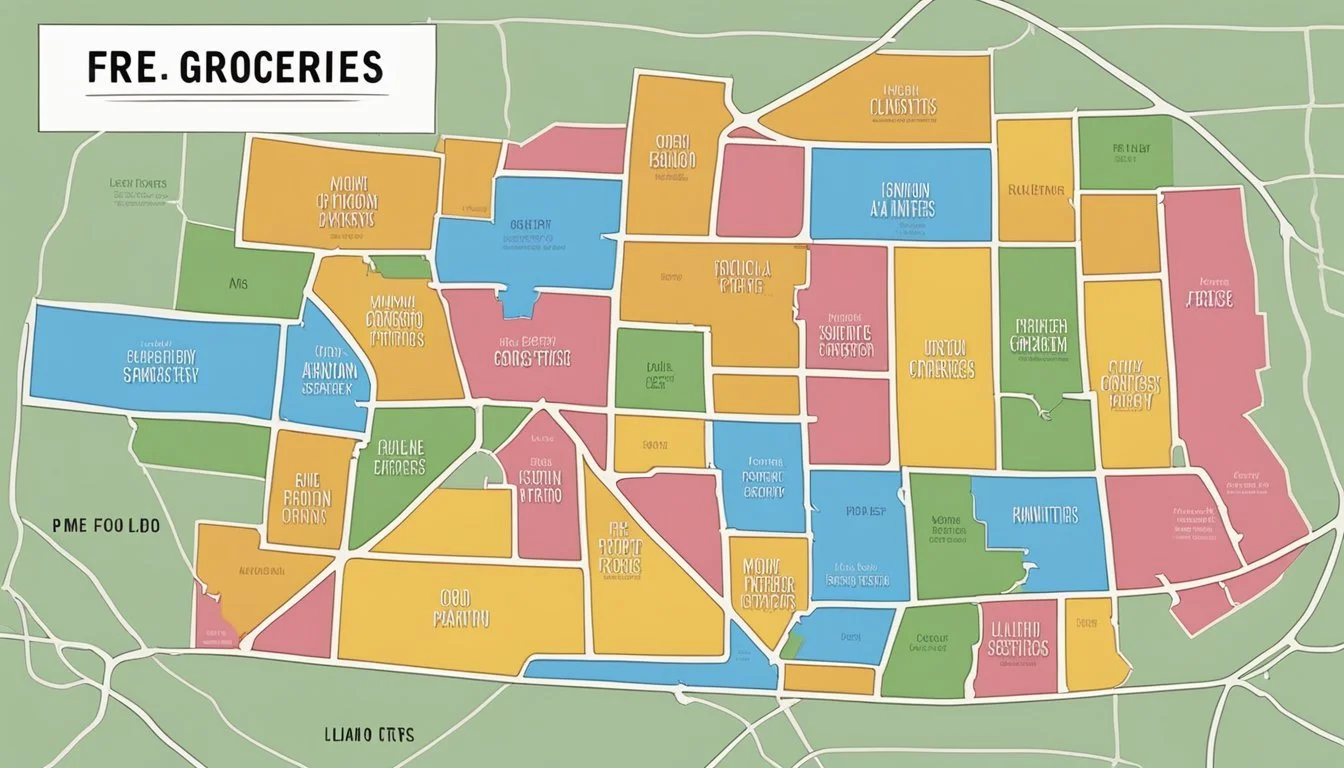Free Groceries and Food Pantries in Llano County, Texas
Your Comprehensive Guide
This Article is Part of Our Guide on Free Groceries in Texas
In Llano County, Texas, access to nutritious food can pose a challenge for many residents facing food insecurity. Food pantries throughout the region have stepped up to provide free groceries, striving to ensure that individuals and families can meet their basic nutritional needs. These community-supported initiatives offer crucial support, demonstrating a collective commitment to addressing hunger and enhancing food accessibility.
The Llano Food Pantry, working in tandem with the Central Texas Food Bank, is a notable example, offering food distribution on designated days to serve those in need within the community. With a system in place that enables eligible residents to obtain food staples, local food pantries are vital in mitigating the effects of food scarcity and bolstering community resilience.
Establishments such as Helping Hands Food Pantry operate on a volunteer basis, providing a week's worth of groceries and personal care items irrespective of religious beliefs. This underscores the inclusive nature of food assistance programs in Llano, which are designed to serve diverse populations and uphold the dignity of all individuals seeking help.
Understanding Food Insecurity in Llano County
In Llano County, Texas, food insecurity presents a challenge to the well-being of many residents, affecting diverse demographics including children, seniors, and low-income families.
Impact of Food Insecurity on Communities
Food insecurity in Llano County manifests through limited access to nutritious food, which can lead to health complications and stress on community resources. Children and seniors are particularly vulnerable, as insufficient nutrition can impede a child's development and exacerbate health conditions in the elderly. For low-income families, the lack of access to healthy food options often correlates with increased risk for diet-related diseases.
Demographics Affected by Food Scarcity
The demographics most impacted by food scarcity in Llano County encompass children, seniors, and low-income households. They often rely on local food pantries and assistance programs to meet their daily food needs. Hunger persists as an issue, and while the region has several initiatives in place to combat this problem, the demand for food aid underscores the prevalence of food insecurity among these populations.
Children: Struggle with access to regular and healthy meals, impacting their educational outcomes.
Seniors: Face challenges due to fixed incomes and medical needs.
Low-Income Families: Often must choose between paying for food and other essentials like housing and healthcare.
Mapping Food Banks and Pantries
Access to free groceries and support from food banks is essential for those in need. This section provides specific information about food bank locations and hours of operation in Llano County, as well as details on partnerships with the Central Texas Food Bank.
Locations and Hours of Operation
Llano Food Pantry
Address: It can be found within Llano County, though the precise location is unspecified here.
Hours: Operates the 1st and 3rd Friday of each month, from 9:00 a.m. to 12:00 p.m.
Individuals requiring food assistance should verify the details by contacting the pantry directly, as hours and locations may be subject to change.
Central Texas Food Bank Partners
Partners of the Central Texas Food Bank work cohesively to serve communities. They are instrumental in addressing food insecurity across Central Texas, including Llano County. The partnership network ensures that assistance is extended to those in various zip codes, increasing the reach to the nearest people in need. To find a nearby partner organization, one can consult the Central Texas Food Bank's website or directly connect with them.
Free Food Distribution Programs
In Llano County, Texas, residents in need have various options for accessing free groceries through food distribution programs. These services include mobile food pantries, convenient drive-thru pantry services, and programs tailored for children and seniors.
Mobile Food Pantry Initiatives
Mobile food pantry programs travel throughout Llano County to reach individuals and families where they live, ensuring that those who cannot travel to a pantry still have access to food. They typically offer a variety of fresh produce, non-perishable items, and sometimes even frozen foods.
Drive-Thru Pantry Services
Drive-thru pantry services, such as those connected with Feeding America, allow individuals to collect pre-selected groceries without leaving their vehicles. This service minimizes physical contact and maximizes convenience, offering a respectful and efficient way to distribute food.
Specialized Programs for Children and Seniors
Specific programs are designed with children and seniors in mind, acknowledging their unique nutritional needs and potential mobility or health issues. These programs might provide age-appropriate food items or partner with organizations that focus on aiding these specific demographics.
Volunteer and Donation Opportunities
The active participation of volunteers and the generosity of donors are essential for Llano County food pantries to provide resources to those in need. These actions contribute significantly to the mission of local food banks in combating hunger.
How to Volunteer at Local Pantries
Individuals looking to contribute their time can sign up for volunteer shifts at Llano food pantries, which are typically listed on their respective websites. Examples of volunteer activities include:
Sorting and packing food items
Assisting with meal distribution
Providing administrative support
Those interested are encouraged to contact the Llano Food Pantry or similar organizations to inquire about volunteer opportunities.
Guidelines for Food and Monetary Donations
Donations are vital for food pantries to sustain their operations. When considering donating, please follow these guidelines:
Food Donations: Non-perishable food items are always needed. These include canned goods, dry pasta, and rice.
Monetary Donations: As most pantries are 501(c)(3) organizations, financial contributions are tax-deductible. Monetary donations allow pantries to purchase specific food items in bulk and provide infrastructure support.
Community members can donate to facilities like the Llano Food Pantry or through partner programs such as the Central Texas Food Bank. Individuals and corporations seeking to donate can contact these organizations directly for detailed information on making contributions.
Eligibility and Access to Food Assistance
Llano County residents seeking food assistance have multiple options, including federal programs like SNAP and WIC. Eligibility for these programs is determined by factors such as income and household size.
Qualifying for SNAP and WIC Programs
The Supplemental Nutrition Assistance Program (SNAP) and the Women, Infants, and Children (WIC) program both serve as crucial supports for low-income families in need of food assistance. To qualify for these programs, applicants must meet certain income thresholds, which are typically set at a percentage of the federal poverty level.
SNAP: Requires that households meet both gross and net income tests, with exceptions for those with disabled family members or those over the age of 60.
WIC: Targets pregnant women, postpartum women, infants, and children up to age 5, focusing on nutritional needs.
Navigating Documentation and Eligibility
When applying for food assistance programs, individuals must provide ample documentation to prove their need and verify their eligibility. Required documentation often includes:
Identification:
Photo ID
Social Security cards for all household members
Income verification for all household members:
Pay stubs
Benefit statements
Tax returns
Furthermore, the application process for programs like SNAP and WIC involves detailed assessments of a household's financial situation and may include an interview to evaluate eligibility. It's essential for applicants to have all necessary documentation in order to streamline the process and receive assistance promptly.
Educational Resources and Support
In Llano County, Texas, there are specific programs aimed at providing nutrition assistance and culinary education to the community. These initiatives are designed to offer supportive resources, foster food literacy, and enhance the skills needed to make healthier food choices.
Nutrition Assistance and Community Education
The Llano Food Pantry, as part of the Central Texas Food Bank network, provides essential nutrition assistance to those in need. It operates to deliver food that meets basic nutritional needs, operating twice a month. There is also an emphasis on community education, with the pantry and supporting organizations potentially offering guidance on making nutritious food choices and managing food resources more effectively.
Culinary Training and Food Literacy Programs
Culinary training programs may exist within the county to help individuals gain valuable cooking skills, which can improve their prospects for employment in the food industry and enhance their personal life. These programs aim to increase food literacy, ensuring that community members understand the principles of a balanced diet and are able to prepare healthy meals. Local resource centers might provide this type of culinary education, focusing on practical knowledge and hands-on experience.
Additional Community Services and Resources
Llano County, Texas offers a comprehensive network of services and resources aimed at supporting individuals and families in need. From nutritional assistance to housing resources, the county provides opportunities for eligible residents to access various forms of aid.
Connecting with Soup Kitchens and Housing Assistance
Individuals facing food insecurity in Llano County can tap into a network of soup kitchens that offer hot meals. These facilities not only provide sustenance but often work in conjunction with housing assistance programs, ensuring that those who are homeless or at risk of homelessness receive comprehensive support. Llano County's health and human services offices may provide further information on accessing these crucial services.
Agricultural Programs and Community Gardens
Residents can benefit from agricultural programs that contribute to local food production and security. Community gardens within Llano County encourage the communal growing of produce, fostering a sense of unity while also supplementing household food supplies. These initiatives serve as both a practical source of nutrition and a way to educate participants on sustainable agriculture.
Events and Seasonal Programs
Throughout the year, special events and seasonal programs are organized to provide additional assistance to those in need. These may include holiday-specific food drives and distributions, which ensure that residents can celebrate traditional occasions with sufficient food. Local churches and community centers often sponsor these events, making them accessible across Llano County.
Unique Initiatives and Partnerships
In Llano County, Texas, innovative collaborations between food pantries, local churches, and nonprofit organizations demonstrate a strong community response to hunger and food scarcity. These partnerships are pivotal in providing a robust support system for residents in need.
Collaboration with Churches and Non-Profits
Churches in Llano County actively partner with food banks, offering facilities and volunteers for food storage and distribution. Notably, they work with the Llano Food Pantry, ensuring consistent availability of free groceries to individuals and families.
Partner Churches:
Provide space for food storage
Volunteer for food distribution events
Furthermore, non-profit entities, such as the Llano County Community Resource Center, amplify these efforts through logistical support and by funneling resources to maintain the flow of aid.
Non-Profit Involvement:
Coordinate with food banks
Optimize resource allocation
Special Programs During Crises
During crisis situations like the coronavirus pandemic, food pantries have initiated special programs to meet the increased demand for food aid. They ensure that not only people but also their pets are not left without support by running a Pet Food Pantry.
Crisis Response Initiatives:
Expanded distribution hours
Emergency food supply kits
Pet Food Pantry support
Organizations like the Salvation Army play a vital role, offering additional resources and manpower to tackle the heightened challenges seen during emergencies such as COVID-19.
Emergency Resource Provision:
Supplemental food supplies
On-the-ground support staff
Through these focused initiatives and the power of partnership, Llano County maintains a resilient stance against hunger and food insecurity.
FAQs and Assistance Navigation
Navigating the landscape of food assistance in Llano County can be simplified by understanding common inquiries and utilizing available online tools. This section provides guidance on utilizing resources effectively.
Common Questions About Food Aid
Q: Where can one find a food pantry in Llano County?
A: The Llano Food Pantry is located at 1110 Berry in Llano, TX, with their contact number being 325-248-3225.
Q: How does one access a drive-thru pantry?
A: Individuals can locate a drive-thru pantry by entering their zip code in the search feature provided by their local food bank's website.
Q: Are there mobile food pantry services available?
A: Yes, mobile pantries bring free food to various communities on a set schedule, which can be weekly or monthly.
Q: What assistance is available for applying for SNAP benefits?
A: Guidance for applying for SNAP benefits can be found via federal program websites, or by contacting your local food bank for assistance.
Online Resources for Assistance and Information
For locating food assistance:
Online Directory: a browser can be used to access directories like Feeding America to find local food banks and pantries.
Mobile Apps: some food banks offer apps to provide updates on food pantry schedules and locations.
For program information:
Websites: information on federal assistance programs, including changes post-COVID-19, is available on government websites.
School District Portals: for free or reduced-price school meals applications, visit your specific school district's website.
For additional help:
Local community organizations and non-profits may have their own websites or contact centers to provide information about free or discounted meals and groceries.
Browsing Activity:
Remember to clear your browsing activity if privacy is a concern when seeking assistance or information.




